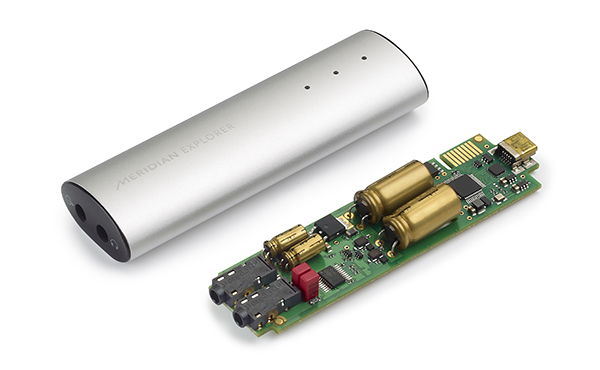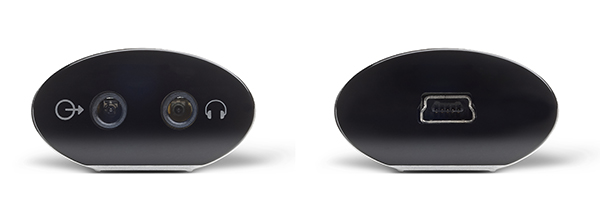Meridian Audio’s Explorer
Desktop audio and portable audio have been two of the fastest growing segments in the audio world for the past few years.
For every twentysomething who’s bought a turntable recently, 100 have bought a pair of headphones. While outboard USB DACs have been gaining popularity, there really haven’t been any that handle 24-bit/192-kHz files with gusto—and with more and more online vendors offering these higher-resolution files, a quality outboard USB DAC is a must.
Bob Stuart, the man behind Meridian, was demonstrating the Explorer at this year’s Consumer Electronics Show in January to a limited audience, and it was obvious that this is a pet project of his. Of course, the sound is fantastic, but the big surprise is the price: This portable Meridian 24/192 DAC (and headphone amplifier) is just $299.
“Now you can have the Meridian experience everywhere you go,” says Stuart with a wily grin, “from your Range Rover equipped with Meridian sound, to your home with one of our systems, to wherever your laptop takes you.”
Beauty on the Inside and the Outside
Made at the Meridian factory in Cambridge, England, the Explorer is a marvel of miniaturization and a shining example of design elegance, from its clean circuit-board layout to its machined-aluminum outer shell. By not following the USB-stick form factor, Meridian eliminates problems that could result from repeatedly plugging and unplugging said item from your laptop and the resulting damage—a clever move.
 “We are trying to avoid the twisting of the USB socket in the computer that headphones plugged into a USB stick risks,” adds Stuart. “Also, having a USB cable, short or long, gives flexibility on the desk. A longer USB cable allows the audio to happen nearer the point of use.”
“We are trying to avoid the twisting of the USB socket in the computer that headphones plugged into a USB stick risks,” adds Stuart. “Also, having a USB cable, short or long, gives flexibility on the desk. A longer USB cable allows the audio to happen nearer the point of use.”
Three pale-white LED lights alert you to the Explorer’s sampling rate: One indicates standard 16/44.1 files, one indicates 24/88 or 24/96 files and the third lights up when taking advantage of the highest resolution 24/176 or 24/192 files.
Jumping in Headfirst
Heading straight for the files I couldn’t play with any of my other portable DACs, I go first for Neil Young’s Harvest in 24/192, which quickly tells me almost everything I need to know about this jewel. The piano intro from “A Man Needs a Maid” floats gently between my ears through the Audeze LCD3 phones. This $2,000 pair of headphones truly reveals just what the Explorer can do. Equally breathtaking results are achieved with Grado SR500, Sennheiser HD 650 and HiFiMan HE-400 phones, proving that the Explorer is equally competent as a headphone amplifier.
The 24/96 version of “Don’t Let it Bring You Down” (from Neil Young’s Live at Massey Hall 1971) lays bare the fine tonal gradation the Explorer is capable of. It paints an accurate picture of this famous hall’s sonic signature as much during the track as at the end, when the applause comes up—the depth is incredible. This no longer feels like budget digital; the Explorer is a serious contender.
Start Your Digital Journey Here
Those looking for a great portable DAC and headphone amplifier in a sleek, stylish case will love the Explorer’s performance, but using it as the digital hub in a home-playback environment is equally impressive. Combining the Explorer with a laptop or desktop and feeding its 2V fixed line-level output to your amplifier is an audibly rich experience. But don’t plug your headphones (or a power amplifier) into this output, as there is no volume control!
Though I still treasure my vinyl, there’s just no way you can achieve anywhere near this level of sound quality with a budget turntable or with discs purchased from your local audiojumble—forget it. Get your hands on an Explorer, load up some high-res files and mothball the budget turntable. This is miles ahead in every way.
Even those loving high-resolution digital audio on a major system now need not be without a fix for great sound—you can take the Explorer anywhere. Thanks to being self-powered by your computer’s USB port, you never need to worry about losing (or having the wrong) wall wart to power it. The only thing that could make the Explorer more intriguing is if M fitted one with a laser. Who knows, maybe we’ll see the Explorer in the next Bond movie—it’s certainly that cool.
Plugging the Explorer into a more traditional system (via the line-level output) consisting of the Burmester 011 preamplifier, 911 power amplifier and a pair of Dynaudio Confidence C1s, the Meridian DAC still holds its own.
Switching the program from rock to some classical, jazz and primarily acoustic titles underscores the level of sophistication available here for 300 bucks. The Explorer is un-digital to the extent you’d expect from a serious four-figure DAC. Whether listening to Herbie Hancock’s “Dolphin Dance” (from the Maiden Voyage album) or Keith Jarrett’s The Köln Concert, the sound now possesses a sophistication that bridges the resolution gap at such a high level that you can forget about the equipment. The attack of stringed instruments, as well as decay and sustain, are all highly convincing through the Explorer.
 Excellent, Regardless of Sampling Rate
Excellent, Regardless of Sampling Rate
Don’t think that you need high-res files to enjoy the Explorer: CD resolution files (16/44.1) are equally marvelous. Bass is tight and snappy, while the upper registers come through with an unmistakable cleanliness and lack of grain. No doubt, the lack of a small, switching power supply (that accompanies many budget, sub-$1,000 DACs) helps here.
Revisiting the Beatles mono remasters, with “Good Day Sunshine” from Revolver, is a treat. The big, weighty vocal textures, which are lovelier in mono, have so much texture and depth through the Explorer that you’ll mistake them for stereo, provided you have a highly resolving system. A number of my audiophile friends were fooled into thinking I was using a much more expensive DAC than the Explorer.
The Crash Test Dummies’ “Just Chillin’,” from the band’s Give Yourself a Hand disc, is a torture test for budget players, thanks to the song’s layered vocal tracks and myriad synthesizer and sound effects. A mediocre DAC flattens this to the point of sounding like XM radio, but yet again the Explorer recreates a wonderful, three-dimensional soundstage, with overblown guitars feeling larger than life and lead vocalist Ellen Reid’s voice sounding equally haunting.
Pushing the Envelope
Most of you will buy the Explorer, plug it in to your computer and enjoy it. The enthusiast fringe can do two things to extract more performance from the Explorer: Get the Pure Music software and get a higher-quality USB cable.
I can’t suggest highly enough that Macintosh users that don’t already have it should download the free 15-day demo of Pure Music (the full version is $129) and investigate the multiple playback options available. Remember, this is geek extra credit. Playing tracks directly from the memory of your computer bumps the believability index even higher, peeling one more layer of grain from the overall presentation. And while the debate over whether or not upgrading to a higher-quality USB cable truly improves digital playback, we’ll stick our collective necks out and vote for this inexpensive upgrade. The $99 Wireworld Starlight USB cable added as much palpability to the midrange presentation of the Explorer as did switching from iTunes to Pure Music.
Revisiting the Neil Young tracks from the beginning of the review, quickly swapping the cable in and out of the system, proved convincing to everyone taking the time to listen—from experienced audiophiles (perhaps the most skeptical audience of all) to uninitiated music lovers. One thing they all agreed on was the amazing experience that the Explorer provides. Meridian Audio couldn’t have picked a more appropriate name for this amazing little device: Regardless of where you are in your digital audio journey, the Meridian Explorer will serve you well.
Progress in the world of computer audio is advancing briskly, but for the moment, Meridian is at the top of the heap. The Explorer offers the most versatility, reveals more music than its competitors and possesses the most stunning industrial design—a more-than worthy recipient of one of our Exceptional Value Award for 2013. It’s an exciting time to be a music lover.
The Meridian Audio Explorer
MSRP: $299


